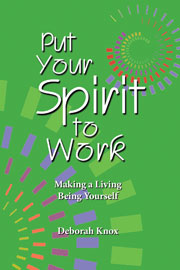ANNOUNCING AN EXTRAORDINARY VIRTUAL BOOK BLOG
May 14 – May 18, 2012 featuring 5 outstanding, insightful authors with varied areas of expertise in the wonderful world of personal growth and development. We hope you’ll enjoy hearing from our other colleagues. Thank you for your interest!)
Deborah Knox, Author, Put Your Spirit to Work: Making a Living Being Yourself, www.lifeworktranitions.com
Gail McMeekin, Author, 12 Secrets of Highly Successful Women, 12 Secrets of Highly Creative Women, 12 Secrets of Highly Creative Women Journal, www.creativesuccess.com
Helen Rivas Rose, Author, Brave: A Memoir of Overcoming Shyness http://www.shynessbook.com/
Roberta Taylor, Author, The Couple’s Retirement Puzzle: 10 Must-Have Conversations for Transitioning to the Second Half of Life. www.Robertataylor.com
Amy Wood, Author, Life Your Way: Refresh Your Approach to Success and Breathe Easier in a Fast-Paced World, www.amywoodpsyd.com
************************************************************************
Making a career transition, whether it’s to find a new job, assume new responsibilities or start a business, is stressful. If the stress is positive, it can increase your chances for success. If it’s negative, however, it can undermine your efforts when you most need to project confidence and achieve results.
Hiring managers, for instance, often can detect anxiety and desperation during job interviews. Executives who can’t handle change-related stress won’t be effective in the current corporate workplace because jobs today involve constant change.
If you plan to start a business, you need support, a business plan, and start up capital, most likely. Unwelcome work transitions are particularly challenging. Although stress is the body’s physical reaction to pressure from, say, a job loss, the pressure itself isn’t the issue. The stress reaction comes from the perception that the pressure threatens your physical or emotional safety. Thus if you’re frightened of being unemployed, you’ll suffer the same symptoms, such as difficulty breathing, as though you’re being attacked by a tiger. In this intense alarm state, you aren’t likely to job hunt effectively.
Seek Answers
Many stress experts recommend relaxation exercises to calm the alarm state. Invoking the relaxation response helps with the immediate problem, but it doesn’t resolve the underlying source of the alarm. The best approach is a comprehensive program of positive life choices, which can help you to manage underlying fears and enhance your ability to deal with the practical issues involved in a transition.
Using positive choices, you can learn to manage your stress response and capitalize on opportunities to improve your life. There are three choices for coping with the pressure. You can avoid dealing with it entirely; you can modify it to overcome the issue momentarily or you can accept that you can’t avoid it and change your attitude. In this state, you can take charge of stress-producing pressure and handle it effectively.
A successful sales trainer who had lost her enthusiasm for her work knew her attitude had soured, but avoided dealing with the problem. When workshop participants complained that she was uninspiring, she was shocked into action. She modified her approach, hired a co-facilitator and redesigned her courses, but it didn’t resolve the problem.
“I could no longer avoid the truth – it was time for a career change,” she says. “So I cut my overhead, searched for my new passion, and embraced this change as an opportunity to grow in a new direction.”
Stress Test
Managing the stress involved with your transition and using it to your advantage requires identifying the issues that cause discomfort, then taking positive action to resolve them. After being laid off, an accountant rewrote his resume and interviewed at other firms unsuccessfully for several months. He finally realized that he wasn’t interested in a traditional accounting job, but rather, a position with a start-up company where his analytical abilities would directly affect business decisions. He clarified his goals and eventually landed the position he wanted.
Another professional was embarrassed to tell others that she was looking for work because she hadn’t come to terms with losing her previous job. After learning that letting go of a business, job, or career is an ending that needs to be addressed, she resolved her feelings and began asking friends for help with her job search.
To identify unresolved issues, rate your attitude about your transition on the Work Transition Stress Test (at the end of this article). An awareness of what’s wrong is the first step toward managing change. Realize, though, that change is traumatic. If you can’t overcome your fears on your own, seek help from a career counselor or other professional. Don’t wait until you’re totally discouraged before seeking help. A strong support system will speed your transition process. Avoid people who lack optimism – they won’t help you discover new opportunities.
If you’re confused about your goals, consider a career assessment. An assessment can save time and money if it helps you to match your talents and interests with specific goals and compatible work environments. To land another job, you must be clear about what you offer employers. A professional who was laid off twice in two years sought a career assessment. After determining her focus, she began targeting more appropriate positions.
Goal Setting
Being realistic about what you can accomplish and how long it will take can help to reduce negative stress. Determine how much time you’ll need to land a job at your salary level, start a business in your field or achieve other transitional goals, then set realistic daily and weekly objectives. One executive who bought an office services franchise knew he couldn’t draw an adequate salary for three years. To cope during the interim, he sold his house and rented an apartment.
To minimize money worries, develop a comprehensive financial plan for your transition. Consider such imaginative options as bartering or project work in addition to seeking loans or selling assets. One manager worked part-time for his brother during his transition in exchange for an office and secretarial support. Another moved into her mother’s apartment for six months while she launched a business.
Stay Connected
Many job hunters find their fears multiply because they become isolated. Remain actively involved with family, friends, leisure activities, and hobbies. Seek the companionship and advice of others who have thrived after a work transition. Their success will inspire you. While trying to change careers from banking to public relations, an executive became so frustrated that he began applying for banking jobs. Still, he sought a mentor in public relations, who mentioned the executive to a golf partner. The conversation helped the executive land a PR position with an excellent firm.
Maintaining a balanced, healthy lifestyle will boost your energy level. Eat nutritious food, exercise regularly and sleep well. If you’re a workaholic, use the transition to learn to enjoy life. A professional’s bout with arthritis forced her to readjust her priorities during a leave of absence from her 80-hour-a-week job. She learned yoga, fell in love, and returned to work a year later with a company that supported her wellness.
Use positive affirmations and visualization techniques to boost your self-confidence. A job hunter imagined using her creativity to plan exciting projects. She found the position she wanted by visualizing it clearly and rejecting offers that didn’t meet her goals.
Relaxation Techniques
Meditation and relaxation diminish the alarm state and soothe the psyche. To rest your mind and body, practice daily meditation and relaxation exercises. The more relaxed and calm you are, the easier it is to make a good impression. In this state, many people also get their best ideas. While meditating, one executive heard a mental voice saying, “brainstorm, brainstorm.” The words became the name of his new consulting business.
Discovering the right work choice is a challenging opportunity to take charge of your life. Determining how to apply your skills and experience and knowing that you can conquer change-related stress can increase your self-reliance and better prepare you for today’s workplace.
Work Transition Stress Test
Using the following rating scale, number each item below according to how often it activates negative stress for you:
1. Never 2. Seldom 3. Sometimes 4. Often 5. Always
____1. I’m uncertain about how to conduct a successful job search, write a new business plan or redesign my current job.
____2. I don’t have an organized, convenient and quiet place to make telephone calls and do transition-related tasks.
____3. I’m easily distracted by other projects or priorities.
____4. Other people interrupt or distract me when I’m working.
____5. The fear of failure is constantly on my mind.
____6. I’m not interviewing/networking well.
____7. I feel angry and embarrassed about being in transition.
____8. I feel overwhelmed by all that I need to do.
____9. I can’t relax and enjoy my time off.
____10. I have difficulty calling people I don’t know for job/career/business information.
____11. I dread going to professional association/networking/support meetings, so I don’t go.
____12. I’m working hard on completing this transition, but I’m not accomplishing much.
____13. I keep changing my mind about which direction I’m pursuing.
____14. I don’t have enough to do or know what I should do next.
____15. I’m confused about career options and interests.
____16. I can’t find any jobs/businesses that interest me.
____17. I keep thinking that I should have completed this transition by now.
____18. I procrastinate a lot.
____19. I don’t have ongoing support from family, friends or other people in work transitions.
____20. I don’t feel as energetic as I used to.
Scoring: Items rated a 4 or 5 require problem-solving because they’re likely to be blocking your objectives.

Gail McMeekin, LICSW, is the Passionate Mentor/Coach to creative women and the author of the best-selling trio of books: The 12 Secrets of Highly Creative Women, The 12 Secrets of Highly Successful Women, and The 12 Secrets of Highly Creative Women Journal. Check out her coaching services, Focus Groups, and inspired products at http://www.creativesuccess.com .
Copyright 2012, Creative Success, LLC.


